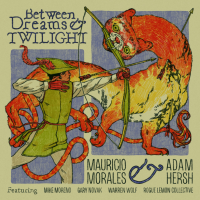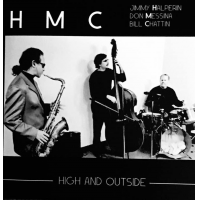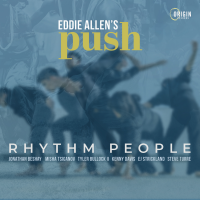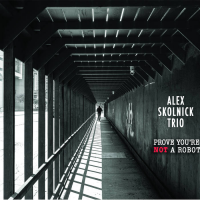Home » Jazz Articles » Album Review » Joe Henderson; Kenny Dorham; Wayne Shorter: Our Thing; W...
Joe Henderson; Kenny Dorham; Wayne Shorter: Our Thing; Whistle Stop; The All Seeing Eye
Henderson’s Our Thing was the tenor master’s second Blue Note outing, and it documents his renowned association with Dorham, who joins him in the frontline. But perhaps even more attractive is the relatively rare sideman appearance by pianist Andrew Hill. Bassist Eddie Khan and drummer Pete La Roca were two of the more obscure, but no less brilliant, members of the Blue Note stable of this period. Rhythm section-wise, then, Our Thing is a jewel — an inspired missive from players we don’t get to hear on a great many records. The famed Henderson/Dorham chemistry puts it over the top. Three of the five tracks are by Dorham: "Pedro’s Time," "Back Road," and "Escapade" all share a medium-to-slow tempo and a somewhat eclectic thrust. "Back Road" sounds a bit like "Blues March" with a western feel. Henderson, still young at this point, is at his very best, having developed all the hallmarks of his highly individual tenor style. His up-tempo opening blues, "Teeter Totter," borrows its turnaround from "Freddie Freeloader" (and reappears at the end of the program as an alternate take), and his title track embeds meter changes in the solo form, making the tune an obstacle course that is negotiated with particular aplomb by Andrew Hill. (In his new liner notes, Bob Blumenthal usefully corrects an error in Leonard Feather’s original essay, noting that Hill was born not in Haiti, but rather in Chicago.)
Dorham’s Whistle Stop was recorded more than two years prior to Our Thing, before Joe Henderson had come on the scene. Here Hank Mobley is the second horn. His smoother, more introverted style contrasts richly with Henderson’s, and his rapport with Dorham is also quite strong. This album is also indelibly marked by the explosive bass/drum team of Paul Chambers and Philly Joe Jones, who had until recently been the backbone of the first great Miles Davis Quintet. (At the time of this recording, Mobley was a member of Davis’s group, so the fingerprint of Miles was surely stamped in the consciousness of all these players.) The program consists entirely of Dorham originals, with the solid hard bop blues "‘Philly’ Twist" leading off. "Whistle Stop" is a rhythm changes tune with a modified bridge, and "Windmill" is based on "Sweet Georgia Brown" changes. "Buffalo" is an Art Blakey-style slow blues. Three other tracks showcase an eclecticism similar to that heard on Our Thing : "Sunrise" has a Latin theme and features Dorham on muted trumpet, while "Sunset in Mexico" finds Dorham approximating a Mexican motif, which he refers to repeatedly during his solo. The most fascinating piece, however, is the last, "Dorham’s Epitaph." Barely exceeding one minute, this brief outline of a ballad takes on added poignancy considering that Dorham would face an untimely demise in 1972.
The All Seeing Eye is by far the most "outside" of these three recordings. It’s also arguably the "outest" album in Wayne Shorter’s entire Blue Note discography. Recorded in late 1965, the album features a fairly large ensemble (four horns, piano, bass, and drums) and relatively lengthy tracks. It’s an ambitious suite dealing with the omniscience of God, and it seems to represent Shorter reaching beyond himself, beyond the limits of even his most daring and extraordinary work. We should recall that this was an especially fruitful time for Shorter: three of his classic Blue Note LPs were released in 1964, and his history-making membership in the second great Miles Davis Quintet was just getting off the ground. The All Seeing Eye gives some indication of the radical heights to which Shorter was aspiring, well before the seismic shifts of Davis’s Bitches Brew and its aftermath.
The stunning title track is a maelstrom of fast, modal swing, with sudden shifts into free, rubato passages. Shorter, Freddie Hubbard, Herbie Hancock, and a roaring Joe Chambers blow off a great deal of steam. "Genesis" begins with a horn chorale, eases into a Ron Carter bass solo, and erupts into brisk swing before settling back down with a free statement by trombonist Grachan Moncur III. "Chaos," paradoxically the most straightforward track, features burning alto work by James Spaulding and a truly bracing solo by Hancock. The final two tracks are a departure: "Face of the Deep" is one of Shorter’s darkest, most mysterious ballads, and "Mephistopheles" is based on a rhythmic drone — almost a military march figure — that persists underneath the solos. Shorter’s brother, Alan, is featured on flugelhorn, and Moncur’s solo spot is downright ominous. Overall, this music has all the swinging post-bop fire of the second Miles quintet, but it takes frequent left turns into a more atonal concept along the lines of Sam Rivers (who at this time was also recording for Blue Note).
Three major figures in modern jazz, three great (but not tremendously famous) albums. The music therein speaks volumes about jazz’s creative evolution during the early to mid 1960s, but the fact is that this would be great music in any era.
Track Listing
Our Thing: 1. Teeter Totter 2. Pedro
Personnel
Wayne Shorter
saxophoneOur Thing: Joe Henderson, tenor sax; Kenny Dorham, trumpet; Andrew Hill, piano; Eddie Khan, bass; Pete La Roca, drums
Whistle Stop: Kenny Dorham, trumpet; Hank Mobley, tenor sax; Kenny Drew, piano; Paul Chambers, bass; Philly Joe Jones, drums
The All Seeing Eye: Freddie Hubbard, trumpet, flugelhorn; Alan Shorter, flugelhorn (track 5); Grachan Moncur III, trombone; James Spaulding, alto sax; Wayne Shorter, tenor sax; Herbie Hancock, piano; Ron Carter, bass; Joe Chambers, drums
Album information
Title: Our Thing; Whistle Stop; The All Seeing Eye | Year Released: 2001 | Record Label: Blue Note Records
Tags
PREVIOUS / NEXT
Support All About Jazz
 All About Jazz has been a pillar of jazz since 1995, championing it as an art form and, more importantly, supporting the musicians who make it. Our enduring commitment has made "AAJ" one of the most culturally important websites of its kind, read by hundreds of thousands of fans, musicians and industry figures every month.
All About Jazz has been a pillar of jazz since 1995, championing it as an art form and, more importantly, supporting the musicians who make it. Our enduring commitment has made "AAJ" one of the most culturally important websites of its kind, read by hundreds of thousands of fans, musicians and industry figures every month.




















